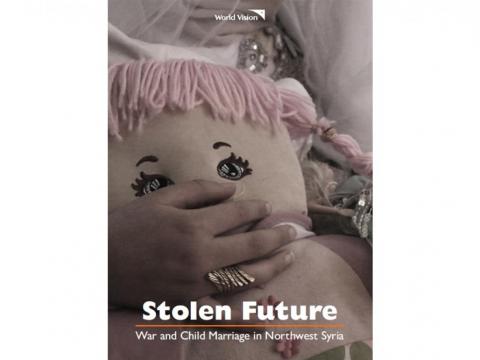Children report an alarming increase in child marriage in Syria, World Vision research finds

A report released today by international aid agency, World Vision, reveals that child marriage has significantly increased in northwest Syria since conflict began ten years ago.
The report entitled Stolen Future: War and Child Marriage in Northwest Syria found that:
- Child marriage has become more common since the conflict in Syria began according to almost 100% of girls and 94% of boys surveyed.
- More than half of women and girls surveyed said that the fear of sexual exploitation, abuse and kidnapping drove forced early marriage.
- Increased use of Social Media was identified by males as a leading driver of child marriage for girls to protect family honour.
- 70% of girls and women said that child brides were at increased risk of domestic violence
Although rates of child marriage were recorded in Syria before conflict began ten years ago, the practice has significantly increased driven by conflict, displacement, poverty, and social and cultural pressures. In northwest Syria, an estimated 2.8 million people are in need, out of a total population of 4 million. Children are being exposed to a number of threats, including forced marriage, as households are driven to new depths of vulnerability and desperation.
“Child protection is a major concern inside Syria. As conflict continues, vulnerabilities of children, in particular girls, grows exponentially. This is a stain on our collective moral obligation to uphold the rights of these children. The impact of COVID-19 is already pushing displaced people living in extreme poverty to new depths of destitution and we could see child marriage figures increase even further” said Eleanor Monbiot, World Vision’s Regional Leader for the Middle East and Eastern Europe.
The report found that increased social media use is also causing parents to choose child marriage over the perceived threat to family honour that this modern phenomenon creates.
“Social media is recognised as a key coping mechanism tool to help displaced communities escape their reality. However, some parents feel that it also creates a situation where they have limited ability to monitor their children’s interactions with the opposite sex. As a result, child marriage is viewed as preferable to the impact a loss of family honour could have.” said Ms Monbiot.
Parents however, are largely driven by the instinct to protect their children and ensure they are provided for when choosing to place them in child marriage.
“Many respondents stated that fear or exploitation and abuse, as well as the desire to ensure economic security were key drivers of child marriage. However, the reality is that child marriage offers little protection from abuse and is accompanied by significant physical and psychological harm, mental health challenges, increased domestic violence, early withdrawal from education and multidimensional poverty” said Ms Monbiot.
World Leaders are meeting virtually next week for the Fourth Brussels Conference on the Future of Syria where they hope to work towards a lasting nation-wide ceasefire and pledge much needed resources to respond to the crisis.
“If global leaders are serious about the future of Syria, they cannot ignore the issues facing millions of the country’s children. They have the power and resources to alleviate suffering, and must use this conference to show solidarity with the most affected girls and boys,” says Dana Buzducea, Partnership Leader for Advocacy and External Engagement at World Vision International.
“Child marriage is not an inevitability of conflict. It is driven by desperation and vulnerability, and enabled by a collective failure to prioritise and strengthen child protection systems. We hope that the Brussels Conference will mark the beginning of the end of this failure and will finally bring change for vulnerable Syrian children,” concluded Ms Buzducea.
ENDS.
Notes to editors
- For further information or to organise an interview, please contact:
Elias Abu Ata, Syria Response Communications Manager, World Vision International
Phone: +962 775 446 556 | E-mail: elias_abuata@wvi.org
- Regional spokespeople are available for interview.
- Case studies, photos and b-roll are available on request.
- *All names have been changes to protect identities
- In Syria, World Vision works through partners to support water stations and deliver emergency assistance, including kitchen kits, hygiene kits, winter assistance and multi-purpose cash grants. The global aid agency also provides the Syrian population, women and children, in particular, with protection from preventable diseases and increases access to essential health services. Humanitarian protection, tackling Gender-Based Violence (GBV) and improving Child Protection (CP) are at the centre of World Vision’s response in Syria, in addition to reducing barriers to education and facilitating continuity of learning for Syrian children.
- World Vision, along with partners of No Lost Generation, is organising a side event to the 4th Brussels Conference on the Future of Syria and the Region. The “Keeping the Promise for a No Lost Generation: Protecting, Educating and Listening to the Voice of Syria’s Children, Adolescents and Young People” event will bring together representatives from World Vision, ECHO (European Commission), EU MS representatives, UNICEF, Save the Children and youth representatives.
World Vision is a Christian humanitarian organisation dedicated to working with children, families and their communities to reach their full potential by tackling the root causes of poverty and injustice. World Vision serves all people, regardless of religion, race, ethnicity or gender. For more information, please visit www.wvi.org or follow us on Twitter @WorldVision